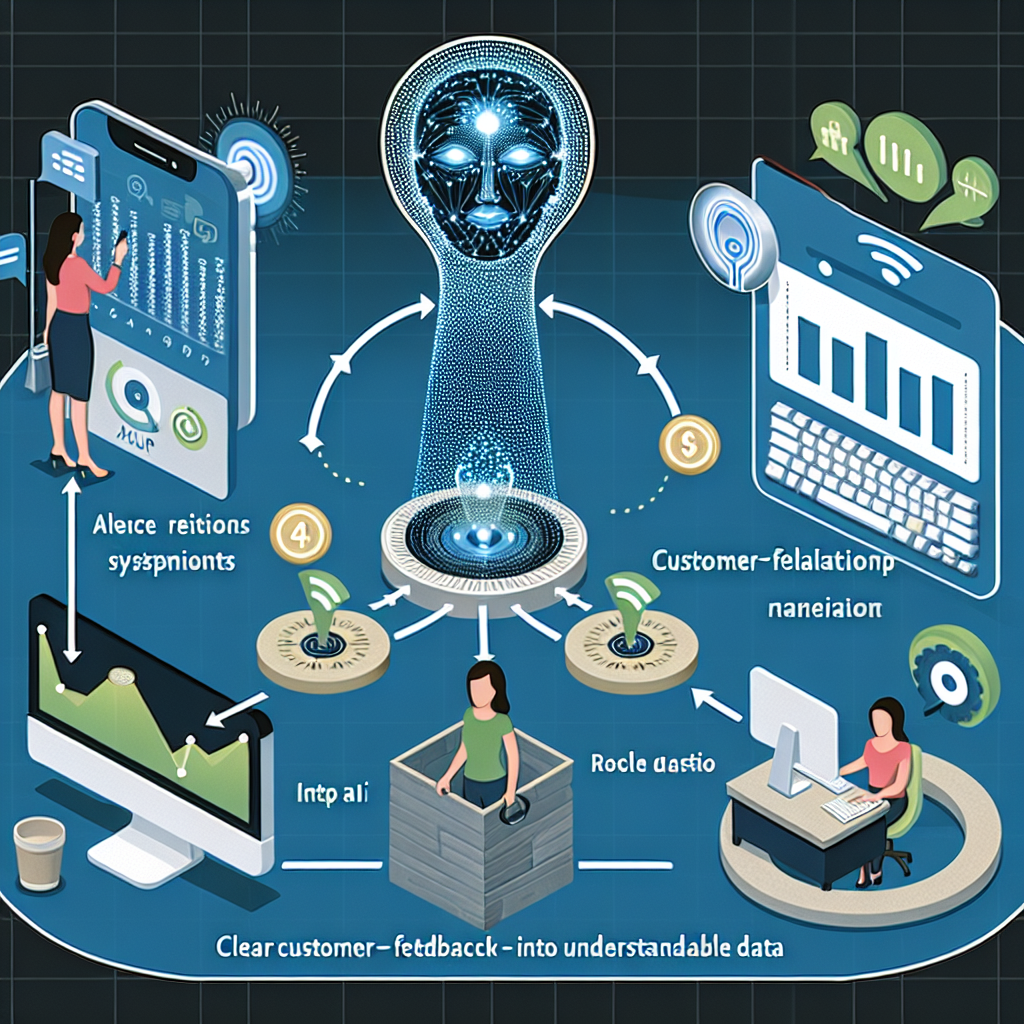
As businesses increasingly harness the power of artificial intelligence (AI), a new wave of technology has evolved — voice-based surveys. Beer surveys, among other types of customer feedback systems, have harnessed the potential of AI to glean insightful customer responses, thereby shaping the face of post-call feedback collection.

Voice-based surveys, aided by complex AI algorithms and innovative machine learning mechanisms, is revolutionizing the customer service sector by delivering accurate, comprehensive insights into customer sentiment post-interaction. These innovative survey systems lend customers a seamless platform to express both their satisfactions and grievances following an interaction with a brand or service. The strength behind these voice-automated surveys lies in their Natural Language Processing (NLP) capabilities, a subset of AI, which enables an intricate understanding of the customer's spoken feedback.
The application of these voice-automated feedback collection tools isn't just limited to customer service communication. This advanced technology has been effective in market research, employee feedback, and many other areas requiring fast, reliable, and unfiltered responses. These AI-enabled tools help organizations measure their customer touchpoints value and design strategies to enhance the overall customer experience.
The advent of voice-centric surveys have eradicated the challenges associated with traditional text or choice-based surveys, making the process more user-friendly, precise and speedy. Exploring the depths of these AI-enabled voice feedback technologies not only enables businesses to stay ahead of the curve but also demonstrates their willingness to embrace metamorphic changes in the digital realm.
This advancement in feedback gathering is a key pillar in the modern customer service ecosystem, driving deeper engagement, honed insights, and ultimately, improved business outcomes.
Artificial Intelligence (AI) has proven its worth in various fields, and customer feedback collection is no exception. With the advent of voice-based survey technologies, businesses are harnessing the power of AI to automate and personalize post-call surveys, thereby boosting both efficiency and effectiveness.
One of the major applications of AI is in the automation of surveys. Traditional methods of survey delivery can be cumbersome and time-consuming. However, AI-driven systems are capable of conducting voice-based surveys immediately after a customer interaction, minimizing the delay in getting customer feedback. The use of speech recognition enables these systems to glean insights from the customer's responses, even when those responses are in natural language.
AI technology not only automates post-call surveys but also personalizes them. By integrating data analytics capabilities, AI can personalize the survey questions based on the customer's previous interactions with the business. This ensures that no two customers have exactly the same survey experience and that the feedback gathered is most relevant to each individual customer's experience. Personalized surveys can lead to higher response rates and more detailed feedback, providing businesses with a more accurate understanding of their customer service performance. For more details, search for the role of AI in personalizing surveys.
Another exciting aspect lies in the capability of AI to process and analyze data in real-time. Voice responses can be instantly transcribed and converted into structured data, ready for analysis by Natural Language Processing (NLP) algorithms. Here, keywords, sentiments, and themes are extracted providing a precise understanding of customer sentiments and potential pain points. This rapid feedback process allows businesses to quickly identify and rectify areas of concern, thereby improving customer satisfaction levels.
In conclusion, the role of AI in enhancing post-call surveys is of paramount importance. AI-driven voice-based surveys promise better customer engagement, leading to more actionable feedback that can be used to improve customer experience. As AI technologies continue to evolve, businesses can expect even more sophisticated surveying capabilities in the future.
Voice-based surveys offer an innovative solution for capturing customer feedback immediately after a call. These surveys, harnessed by Artificial Intelligence (AI), are not only efficient but also blend effortlessly into existing business systems. One of the most significant benefits they offer is seamless integration with Customer Relationship Management (CRM) systems and other operational tools that may be in use.

The integration of voice-based feedback systems into CRM can facilitate streamlined operations and uninterrupted data flow. When a customer ends a call, they are prompted to share their feedback through a voice survey. This feedback is transcribed by the AI into text, which can be used to generate a summarized report. This AI-processed data can be automatically inserted under the customer's record in the CRM system, thus avoiding manual data entry errors and freeing up valuable time.
Beyond CRM systems, these AI-powered voice surveys can also couple with various other business tools. The system can link the feedback received directly with tools in areas such as Quality Assurance, Customer Success Management, or Sales, ensuring the right information reaches the right departments in real time. This ease of integration makes voice surveys a versatile tool for adapting to diverse business systems.
Moreover, the data gathered from these surveys can also provide valuable insights for Performance Analysis tools. This can, in turn, aid in understanding customer behaviour, evaluating service quality, and enhancing the overall customer experience. The integration of voice-based feedback systems, therefore, extends much beyond mere operational efficiency, opening up realms of strategic benefits.
In summary, the integration of voice-based surveys into business systems driven by AI poses a myriad of advantages, from operational efficiency to strategic insights. This makes their adoption a beneficial proposition in customer-centric businesses. Looking forward, it's easy to see how this technology will play a pivotal role in shaping business strategies and driving customer satisfaction.
In the era of digitalisation, voice-based surveys, powered by artificial intelligence (AI), represent an effective way to gather real-time, post-call feedback. Not only are these surveys highly accessible, but they also offer a range of valuable benefits to take businesses to the next level.
Firstly, using AI-based voice surveys can be a game-changer for any business, owing to their capability for providing real-time feedback. With these surveys, companies can immediately understand customer sentiments, address their queries, and rectify any issues with the utmost urgency, thereby enhancing customer satisfaction and loyalty. Since these digital surveys don't require human intervention, they can be administered round the clock, ensuring continuous feedback.
Secondly, voice surveys leverage natural language processing and speech recognition technologies, therefore leading to a significant increase in engagement rates. This is particularly due to the interactive nature of voice interaction and its welcoming absence of tedious typing tasks needed in traditional text-based surveys. Recent studies on voice technology and customer engagement prove this claim.
Lastly, a significant benefit of AI-based voice surveys is the extraction of actionable insights. With AI's ability to sift through a large amount of voice data quickly and efficiently, businesses can not only get a glimpse into the customer's mind but can also make data-driven decisions to improve their products, services, and overall customer experience. These insights can drive customer-centric strategies that bolster brand reputation and boost business growth. This concept is beautifully elaborated on this page.
In conclusion, automated voice surveys embody the future of customer feedback gathering. They provide real-time feedback, offer higher engagement rates, and facilitate the acquisition of actionable insights, all of which play a pivotal role in businesses' success in today’s customer-focused marketplace.
As technology continues to evolve, businesses are constantly seeking more efficient ways to collect customer feedback. Voice-based surveys, powered by Artificial Intelligence (AI) and voice recognition technology, present a novel opportunity in this area. However, despite the potential benefits, it’s important not to overlook the potential challenges and considerations involved in implementing such a system. Most significantly, questions of data privacy, technological limits, user experience, and cost need to be conscientiously addressed.

The first critical consideration is data privacy. This concern tops the list due to the sensitive nature of the voice data being collected. Companies must make sure to align with global data privacy standards, take necessary precautions to secure the data, and inform the customers about data usage transparently. Any misuse or mishandling of data can lead to serious implications, damaging both customer trust and the company's reputation.
Technological limits form another set of challenges. While AI has made significant strides, the technology is not flawless. Misinterpretation of spoken responses, difficulty understanding accents or dialects, or the inability to process noisy backgrounds can lead to incorrect data capture. It's important to work with a technology partner who truly understands these limitations and offers cutting-edge solutions.
In terms of user experience, voice-based surveys should be brief, relevant, and engaging. Long, monotonous surveys can lead to user fatigue, potentially influencing the accuracy of responses or leading to survey abandonment. Here, the importance of good survey design cannot be overstated.
Lastly, implementing a voice-based survey system can be costly, especially for small businesses. Not just the investment in the technology, but the costs associated with maintaining and updating the system, training staff, and analyzing data. Businesses need to conduct a thorough cost-benefit analysis before deciding to move forward with this approach.
In conclusion, while voice-based surveys using AI hold remarkable promise for gathering post-call feedback, businesses need to consider the associated challenges before incorporating this innovative technology into their customer feedback strategy.
The evolution of customer feedback mechanisms continues to unfurl with artificial intelligence (AI) playing a significant role in enabling businesses to understand and respond to customer needs more accurately and effectively. Venturing into 2022 and beyond, several trends increase the importance of Voice-Based Surveys and post-call feedback collection, enhanced by advanced AI features and integrations.
The rise of conversational AI is leading the charge, with more and more businesses realizing the benefits of incorporating natural language processing (NLP) to gather, interpret, and respond to customer feedback. An integration of real-time public speech recognition into voice-based surveys will significantly improve the quality of customer service offered, with instant transcription and analysis of calls providing invaluable insights into customer behaviour and satisfaction levels. This breakthrough enables subsequent calls to be tailored specifically to customer preferences and behaviour, enhancing the overall customer experience.
Further, the integration of AI with Internet of Things (IoT) devices - collectively termed AIoT - presents another promising direction. With such integration, businesses can tap into a vast pool of data collected from IoT devices for enhancing the effectiveness of voice-based surveys. Real-time feedback from such devices can help anticipate potential service issues even before they manifest, thereby paving the way for proactive initiatives. AIoT is set to revolutionize customer service by changing how companies gather and act upon customer feedback.
In addition, the use of emotion detection in AI solutions indicates a more empathetic approach towards understanding customer feedback. As conversations are about more than words, refined voice-based surveys will not just focus on 'what' the customer is saying, but also 'how' it is said. Emotion detection and sentiment analysis helps businesses dig deeper into customer mindset and feelings, leading to improved strategies and services.
The futuristic vision of voice-based surveys and post-call feedback is expansive, with continual progression in AI technologies ensuring a more refined and efficient system that can cater to a customer's unique needs and enhance service quality.
Start your free trial for My AI Front Desk today, it takes minutes to setup!








